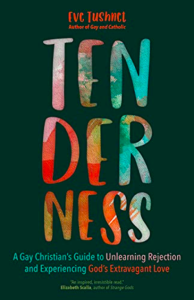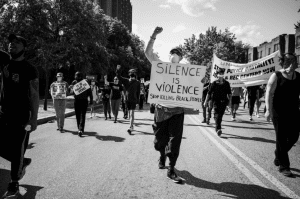Content warning: descriptions of sexual maturation, queerphobic slurs
Honestly, this part was hard to write. To articulate this, you have to be really raw with the pain most queer people grow up with, something that affects a lot of us almost continually (1); for me personally, it’s a pain that has been almost physically oppressive lately. But, this is kinda what I do, so here goes.
I said that imagination is an intellectual exercise, and it is. Imaginative sympathy is what we’re going for here: in other words, imagining experiences vividly enough to react with sympathy, with fellow-feeling for the realities of someone else’s life. So, dear heterosexual reader, try to imagine some of the following scenarios.

You’re a teenage boy who grew up Catholic. You’ve learned, in a vague and abstract way, that homosexuality is a thing and that it’s wrong; you go to a pretty traditional parish, and it comes up in homilies every month or two. Some of your friends have started noticing girls (and talking about them, too, in ways that seem a little weird, though you’d rather die than challenge them on it), but you haven’t so far and you’re kind of worried about being a late bloomer. You’ve also noticed reporting on hate crimes in the news—a gay couple getting beaten, a shooting at a gay bar—and your family and friends grumble about the attention these things get, saying that existing laws already make that sort of violence illegal so why do the queers need some specially protected category? It’s so narcissistic.
One day in class, you’re staring vaguely at your best friend, and you realize you’re getting an erection. And you realize it’s not a coincidence; it’s “about” him. And suddenly every other thing that people have been saying about homosexuality for as long as you can remember is something they are saying about you. That violence from the news, and your family scoffing at it, could happen to you. Your friends think that just being like you is an insult, and the well-meaning adults who tell them not to use the word faggot unintentionally reinforce that belief. The teachers and confessors who criticize coming out seem to be saying that being truthful about what you feel is unacceptable if what you feel isn’t heterosexual; that being known, in your case, makes you harder to love, that the love people show you needs to be honeycombed with reservations and qualifications. You suddenly feel filthy every time you think of your best friend because you have a crush on him, and you pull away because you hate feeling filthy. You want to be good. You beg God to take these feelings away; he doesn’t. You start to wonder if he’s punishing you for something. After two years, you finally bring it up, shaking, in confession; the priest tells you not to reduce yourself to your sexuality, but you can’t just cordon it off—it’s affecting every relationship you have or could have, including your relationship with God.

You’re an evangelical kid, the son of a pastor. You’ve never been competitive or outdoorsy, and you hate roughousing; you like spending time with your mom and sister: all three of you enjoy singing. It’s especially fun hitting high notes. Something feels vaguely off, especially about your clothes, but you’re a dutiful child and you try not to think too much about it.
Puberty hits, and everything starts feeling awful. Your voice breaks, and you can’t sing those beautiful high notes any more. You hate the way your body is changing. You put on a little muscle, but it feels alien and unnatural; your sexual urges seem like a horrible rampaging animal, and you miss the calm you didn’t realize you had. Above all, you’re grossed out by the swelling lump of tissue between your legs. You wish you could be—
You wish you were a girl. That’s it. You don’t hate having a body, but you hate having this body; you crave the ability to bear children. You often lie awake late into the night now, crying over these organs that feel so dead and wrong, occupying you where you feel instinctively a womb is supposed to be.
You read a little online, trying to make sense of what you’re feeling, find other people who feel the same way. You do find some helpful stuff. Transgender is a word you hadn’t really understood before, but it seems like an okay fit for what you’re feeling. You also find a horrible, gigantic cache of news stories. Murders of trans women, sometimes by strangers and other times by romantic partners or even family members, piling up from dozens into hundreds of cases. The idea of maturing into a masculine body makes you feel physically sick, but you’re terrified of what your parents would say if you ever revealed this to them. You could become another statistic.

We live with traumas like these every single day. They have nothing to do with sexual activity or the lack of it, and everything to do with the fact that we are other, we do not experience the standard-issue narrative about sexuality or gender or both, and we are often judged and despised for it. Many Christians categorically reject not just the goodness but the existence of our experiences. “There are no homosexuals,” said Fr Harvey, the founder of Courage, “only heterosexuals with a homosexual problem”—which, whatever he meant by it, says to us, “You’re not only drawn to something sinful, which is bad enough on its own; you’re also too screwed up and stupid to know anything about your own life—that’s my job.”
I’m not saying every queer-identifying person is miserable. But a lot of us are, and it’s both ignorant and cruel to assume it’s all our fault. Christian, you have a duty to try and understand what suffering people feel and why they feel it. Being a believer does not make you omniscient or even wise. Wisdom takes effort. Sit down and try and think of all the times in your daily life when your attractions, your relationships (friendly as well as romantic), your comfort in your very own body, are things you simply take for granted.
Sound hard? It is. Now, try to think how it would feel to never be able to take it for granted.
(1) The Velvet Rage by Alan Downs is a very good exploration of this subject if you want to read more.
Images via Pixabay












